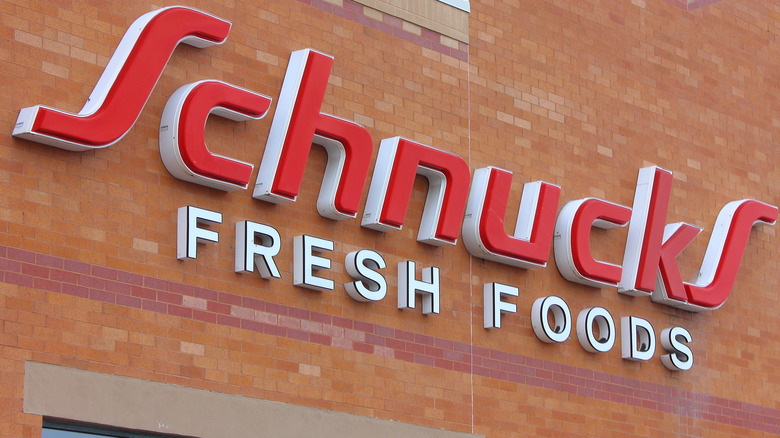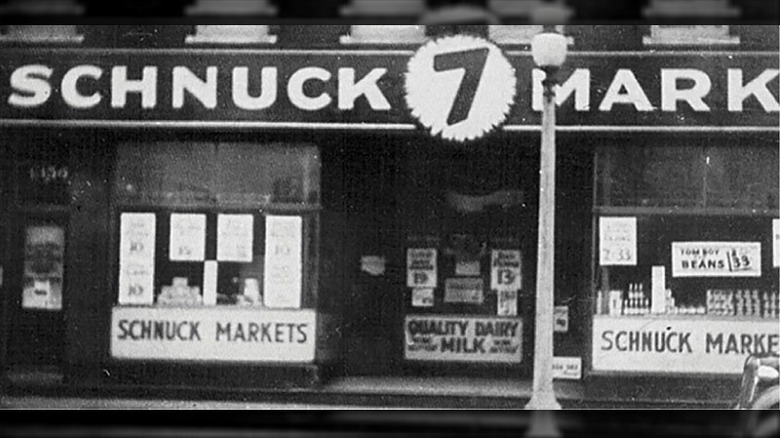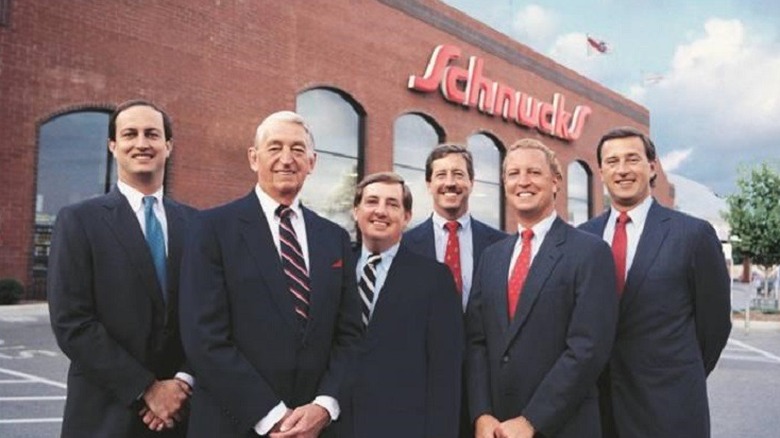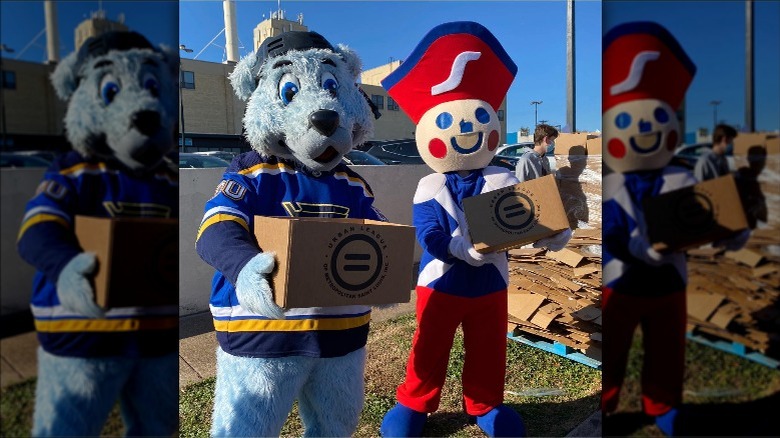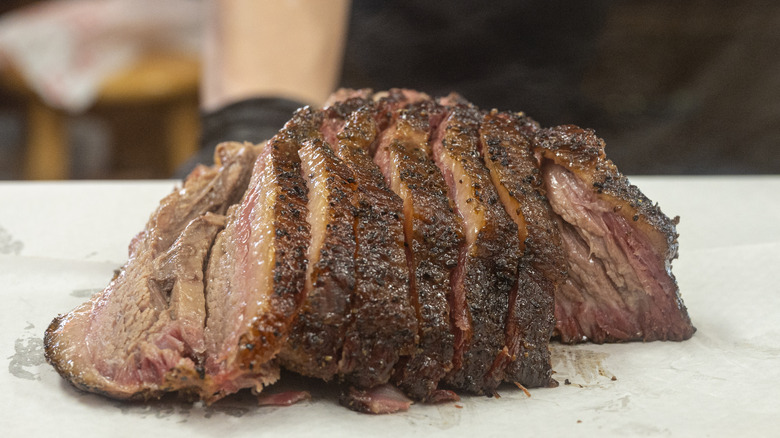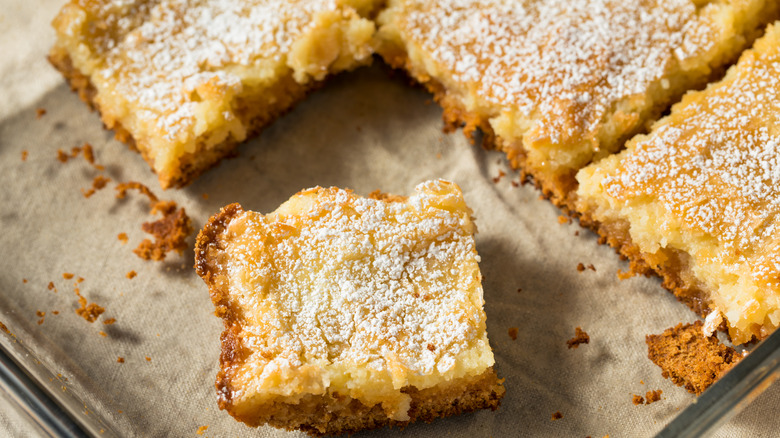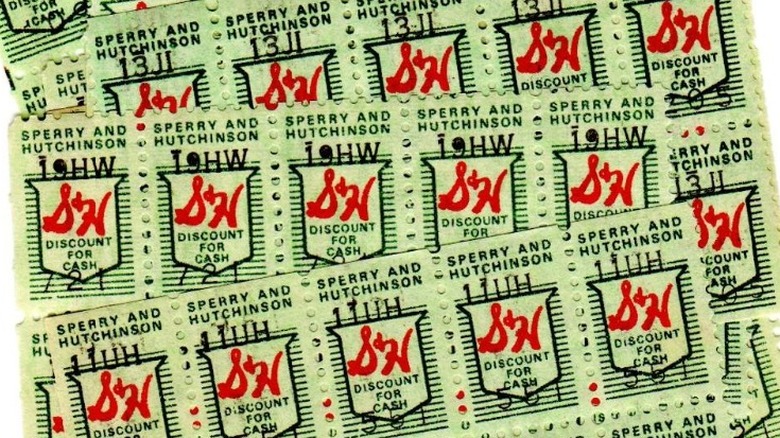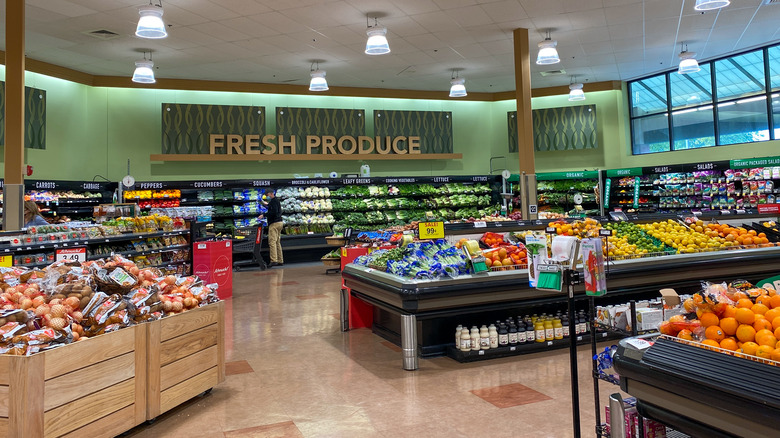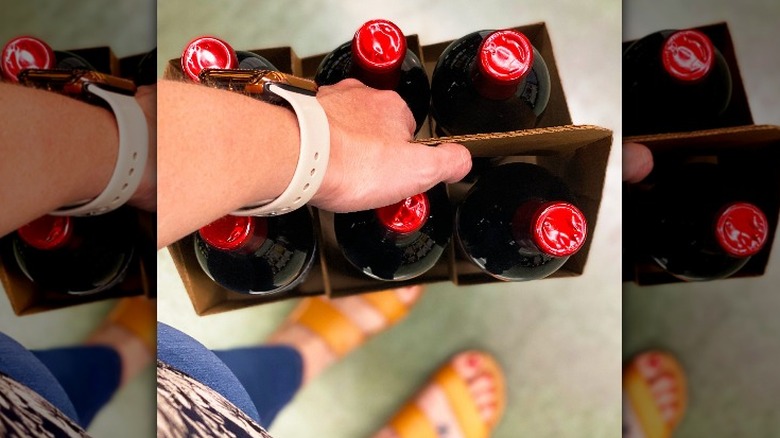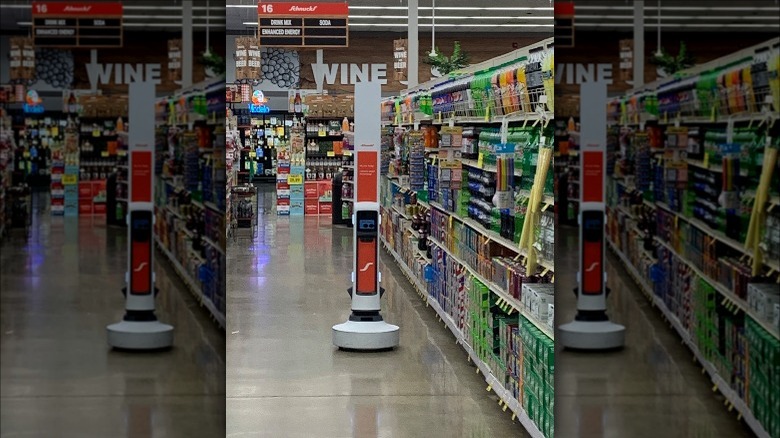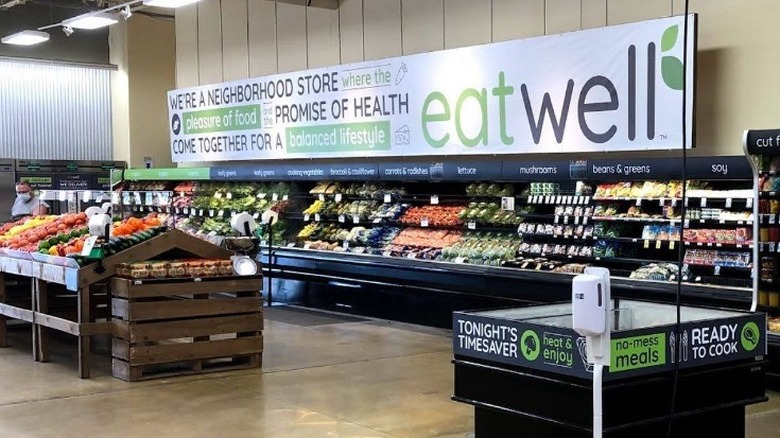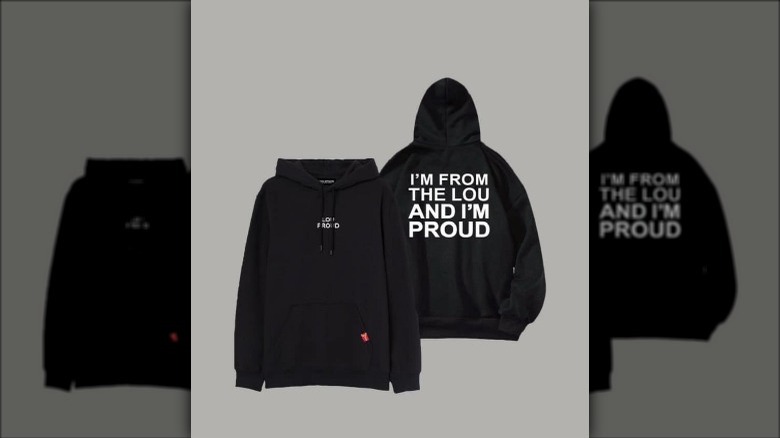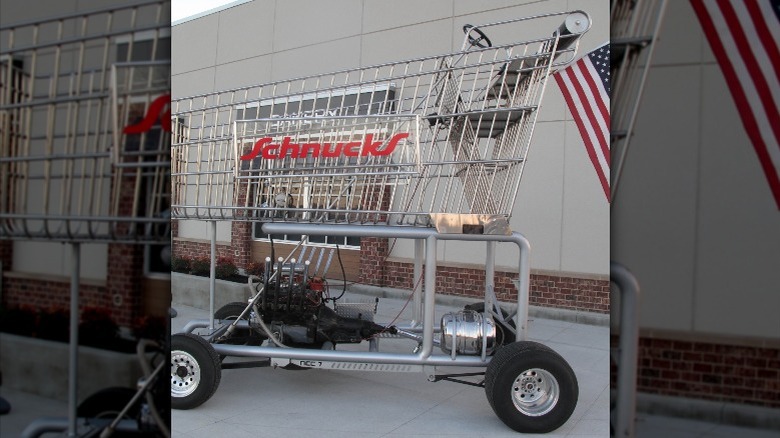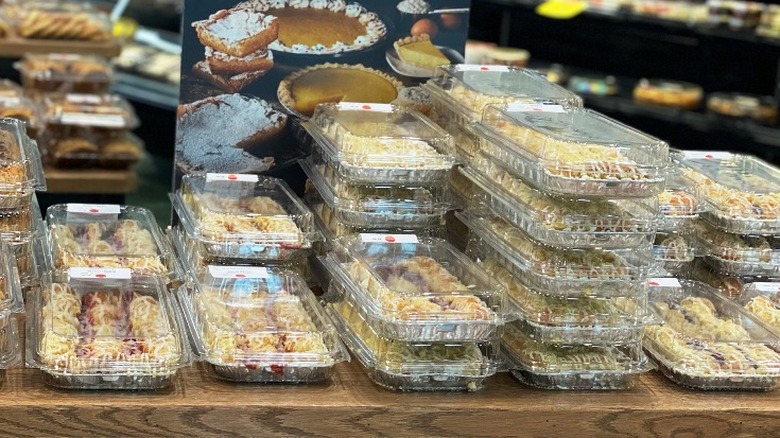The Untold Truth Of Schnucks
St. Louis-based Schnucks is older than the St. Louis Arch itself. The family-run supermarket chain was a good two decades old when they began the construction of the arch in the early 1960s (via Architectural Digest). Per a 2021 Forbes report, Schnucks is now one of the largest privately-owned grocers in the United States. But if you are not from the Midwest, you may not have even heard of them. Here's why: Schnucks never expanded beyond the Midwest.
All of its 111 stores are spread across the states of Missouri, Illinois, Indiana, and Wisconsin (via ScrapeHero). In recent years, Schnucks has faced some hardships — it had to shut some stores because of poor sales, and cut back on store timings due to labor shortages. But, that didn't discourage Schnucks from launching a brand new health concept store and amping up the use of technology on its premises.
The company, which has been run by three generations of the Schnuck family, has stood the test of time, growing from a small mom and pop store to the biggest chain in St. Louis. This is the untold truth of Schnucks.
Schnucks started off as a confectionary store
Edwin Schnuck launched his wholesale meat packaging business in 1937, when the country was still in the midst of the Great Depression (via Schnucks). He and his wife Anna Schnuck weren't well-to-do, but starting the business was a risk that they were willing to take. At the same time, there was another business idea in the making: Anna's potato salad was quite popular among their friends and family, and they were looking for avenues to start selling it (via Facebook). In 1939, the couple started a confectionary store in North St. Louis where Anna sold her salad and coleslaw, and Edwin ran his meat business.
The mom and pop Schnuck, as they were called (via "Southwest Garden"), had three children — sons Edward and Don Schnuck and daughter Annette Schnuck — who as it turned out, were also deeply interested in starting their own stores. So, by 1947, the Schnuck family had seven stores in their hometown St. Louis, and all the stores followed the same philosophy and business style. Over time, the children closed down their stores, and together, the whole family managed just two locations: one at 4356 Manchester in St. Louis, and the other in the St. Louis suburb of Brentwood. Happy with the arrangement, Edwin and his two sons incorporated as Schnuck Markets Inc. in 1952.
Schnucks remains a family-owned business
Founder Edwin Schnuck and his two sons Edward and Don Schnuck managed the business during the first few decades, but during the 1980s and '90s the third generation stepped up (via Schnucks). This included Edward and his wife Marilyn's only child Stephanie, and Don and his wife Doris' six children: Craig, Scott, Todd, Mark, Terry, and Nancy. Craig served as the CEO for 17 years (via Chain Store Age), Scott for the next eight, followed by Todd, who has been at the helm of since 2014 (via And Now You Know).
As for the rest of the siblings, Mark Schnuck manages Schnucks' real estate business as founder and executive chairman of the DESCO Group. Terry Schnuck took on the role of theater producer and is a five-time Tony award winner (via Broadway World), while Nancy Schnuck, per St. Louis Commerce Magazine, is involved with various charitable organizations .
Whether they had an official position at Schnucks or not, the gang of siblings — the "S-7" as they call themselves — met monthly to talk business. "It's a de facto board meeting, but not a formal one. It sounds kind of hokey, but we sit around a round table and talk strategy—we're all equal shareholders," Todd told Ladue News in 2014.
Far from an episode of "Succession," the Schnuck siblings haven't been plagued by family feuds or cold wars. And if they ever did, they plan to follow their late father's advice: "If the business gets in the way of family harmony, then sell the business."
Schnucks used to house railroad-themed restaurants inside its stores
The Schnucks Station Restaurant had a "nostalgic atmosphere of the railroad era" and sold tubs of fried chicken for $2.95, as mentioned in a 1976 ad in the St. Louis Post-Dispatch (via Pinterest). The railroad was a popular theme for restaurants back then. There was the Fritz's Railroad Restaurant, Casey Jones Junction (via The Wichita Eagle), and Victoria Station — all of which were popular in the '60s and '70s. Though the railroad era ended in the early 1900s (via Library of Congress), the restaurant world wasn't done celebrating it.
Taking a cue from its roots of selling potato salad and coleslaw, the store first launched a snack bar concept in 1958, expanding it to a full-blown restaurant by 1961 (via Supermarket News). Schnucks Station Restaurant became a part of many of the chain's locations over the years.
Sadly, you can't dine at a Schnucks Station anymore; the last one closed up shop in 2005 (via Supermarket News). However, that doesn't mean you can't grab a meal at Schnucks. The store in Town and Country, Missouri introduced two instore eateries serving food items made by in-house chefs, and the one in Kirkwood, Missouri, houses a food hall featuring three local restaurants (via St. Louis Magazine).
Schnucks calls itself 'the friendliest store in town'
Schnucks first came up with the tagline "The friendliest stores in town" in 1961, advertising itself as so in a 12-page ad insert in The Shelby Report of the Midwest (via Issuu). The question, however, remains: Do all of its customers and employees feel the same? As far as Facebook reviews go, Schnucks has a 3.5 out of 5 rating (based on the opinion of 1,500 odd people), with some customers using the platform to complain about staff being rude and customer service being below par in certain stores.
In 2018, Schnucks fired an employee in its South St. Louis store for racial discrimination (via The St. Louis American), and in 2021, some of its employees were on the verge of organizing a strike (via St. Louis Post-Dispatch). While Schnucks' friendliness is in question, what seems to be a matter of no doubt is their drive to donate. According to the company, each year they donate approximately $16 million worth of food to those in need. In 2020, the chain donated $500,000 to the St. Louis Regional Response Fund to help those who were struggling to make ends meet, and offered work opportunities to those who lost their jobs/businesses due to the pandemic.
Schnucks claims it introduced the idea of pork steaks
A Facebook post by Schnucks asserts that back in the 1950s Don and Ed Schnuck started selling half-inch slabs of pork shoulder to their customers, promoting it as an inexpensive cut of meat that would be suitable for grilling. Thus, the "pork steak" was born. Or was it?
Robert F. Moss, author of titles such as "Barbecue: The History of an American Institution" and "The Barbecue Lover's Carolinas," disputes this claim. In a post on his website titled "The unexpurgated history of pork steaks," he notes that pork steaks had been advertised by St. Louis grocers since at least 1913, decades prior to the founding of Schnucks. He goes on to indicate that "pork steak" is mentioned in the book "A Course in Household Arts," which was published in 1916, still way before founder Edwin Schnuck bought his first store. Anyhoo, whether or not you plan to go down the rabbit hole of who actually invented the pork steak, definitely consider purchasing the cheap yet flavorful cut at Schnucks or your local butcher the next time you spark up the grill.
Schnucks invented National Gooey Butter Cake Day
If you didn't know National Gooey Butter Cake Day existed, well, now you do (you're welcome!). According to National Day Archives, Schnucks designated the day in 2019 to celebrate the delicious, chewy, and dense pride of St. Louis. According to The New York Times, the dessert was born out of a beautiful mistake by a German baker in St. Louis in the 1930s. No one knows what part of the baking process he goofed up — he might have added extra shortening, sugar or butter, the report assumes. The baker's folly, however, went on to become a classic in the St. Louis region. (Those outside the city, however, tend to view the dessert as being simply flawed.) Schnucks, which shares the same birthplace as the cake, decided to designate August 12 as the day of the gooey butter cake. (If you must know, anyone can register a day with the National Day Calendar by filling out a form.)
After you master this gooey butter cake recipe, Schnucks has ideas to liven it up: How about gooey butter cake ice cream? Or is gooey butter cake s'mores more your speed (via Schnucks)? Besides publishing a ton of recipes on its site, Schnucks also runs a cooking school out of its Des Peres, Missouri store (via Schnucks), where you can probably learn a thing or two about that perfect (or not) cake.
Schnucks was one of the first large supermarkets to do away with trading stamps
Almost all supermarkets in the early 20th century enchanted customers with colorful trading stamps, promising free items in return for their loyalty. Ohio State Law Journal notes that there were around 200 trading stamp companies by the late 1950s, the popular ones being S&H Green Stamps, Gold Bell and Plaid to name a few (via Encyclopedia). According to Time, Schnucks was just one of the 100,000 U.S. retailers which used a trading stamp plan in its stores at that time.
The way trading stamps worked was simple: corresponding to the dollars worth of purchase by each shopper, they got a certain number of stamps. The more stamps the shopper collected, the more points they earned. For example, S&H Green Stamps had a 24-page collection book. You could fill a page with stamps and redeem an item from the store's catalog for 50 points, or fill the whole notebook, and get a premium for 1,200 points. While this seems fair, Time explained why it wasn't: The retailers tended to raise the prices of items in their stores to compensate for the spend on trading stamps. Ultimately, the customer paid the inflated price.
Sensing the scheme as a humbug, Schnucks stopped using trading stamps at its stores in 1968. According to the company, it was among the first food retailers to do so in the St. Louis area. Instead, per The Shelby Report of the Midwest (via Issuu), they came up with "revolutionary low prices" to retain their customer loyalty.
Schnucks is testing out smaller-sized stores
In the current world of grocery store chains, small is big. The retail industry is embracing smaller-sized stores now more than ever, for reasons such as better convenience, speed, and low cost. According to Progressive Grocer, the average store size has decreased over the last 10 years, and is now at a snug 38,000 square feet. The times are a-changin', and Schnucks is aware of that.
In 2021, it opened what might be its smallest store. Measuring 18,000 square feet, the Jasper, Indiana store (the first to be dubbed "Schnucks Fresh") is over three times smaller than a traditional 60,000-square foot Schnucks outlet (via Grocery Dive). Schnucks previously experimented with small format stores, opening a 37,000-square foot store in Warrenton, Missouri, and a 21,000-square foot store in Downtown St. Louis (via Supermarket News).
For Schnucks, it made sense to open a small format store instead of a traditional large store in a small town like Jasper. Schnucks Fresh still has basically everything a traditional store would, just in limited quantities. And according to industry experts, shoppers now generally prefer smaller stores where they can walk in and out in a flash (via Grocery Dive).
Schnucks takes its wine and cheese very seriously
Schnucks has smart tablets installed on the shelves of its liquor aisle just so you don't have to pick a wine bottle based solely on how pretty its label is. According to Progressive Grocer, the tablet plays videos giving insights into the making of the wine, beer, and other spirits sold at the store. But if you are someone who can't watch a reel till the end, there are in-house wine experts you can chat with who will help you pick the right bottle for your new neighbors (via Schnucks).
Though they may call their Wednesdays "Winesdays," Schunucks is pretty serious when it comes to their collection of alcohol. They have an Advanced Sommelier (there are only five in the whole of St. Louis with that certification from The Court of Master Sommeliers, according to Schnucks) on board, run a wine club that offers cooking lessons and opportunities to meet sommeliers from around the world, and publish a boozed-focused newsletter called "The Proof."
To make sure you don't pair your fancy bottle of wine with some slices of American cheeses, Per the chain, Schnucks relies on the expertise of their "cheese guy" Andy DeCou, a member of La Guilde Internationale des Fromages, which is a network of master cheesemakers. While training the staff about the basics of brie and gruyere, he also nudges them to earn certification by the American Cheese Society (via Grocery Dive).
Customers share aisle space with robots
Tally, who you will likely run into while roaming the aisles at Schnucks, is a tall intelligent worker that also happens to be a robot (via Schnucks). It makes three rounds around the store every day, capturing the position of items and the price labels corresponding to them. Tally's job is to make sure all of the shelves are well-stocked all the time, and according to Schnucks, it has helped to reduce the number of out-of-stock items by 20-30%.
Schnucks first debuted the robot in its aisles back in June 2017. Realizing how efficient it was, the chain decided to enlist a Tally, which is developed by San Francisco-based Simbe Robotics, for all of its 111 stores. In doing so, Schnucks became the first grocer in the world to use AI technology to manage inventory at such a big scale, as mentioned in the release.
But Schnucks is not the only supermarket with its own Small Wonder. Retailers such as Giant and Stop & Shop also have a robot called Marty (via Taste of Home), and Amazon uses over 200,000 robots in its warehouses (via BBC).
Schnucks has a whole store dedicated to organic and healthy options
Though Americans love their pizza, hamburgers, and steaks, about 95% of U.S. consumers sought healthy foods during their grocery shopping, according to a 2019 report by the International Food Information Council Foundation and the American Heart Association (via Food Insight). That's great news, but what's not so great is the fact that only 28% have easy access to said healthy foods (via Healthline).
Gauging the shift in trend and the need to fill the very obvious gap, Schnucks opened a store called EatWell, which focuses on organic and healthy food options. According to Supermarket News, the 42,000-square foot store in Columbia, Missouri sells infused waters, rows of kombucha bottles, grass fed beef, sustainable seafood, and other items that would tend to fall into the Whole Foods category.
In 2022, the supermarket chain drove the "eat healthy" mantra further by launching a program called Good For You in partnership with the nutrition technology startup Spoon Guru. The program, per Grocery Dive, helps customers monitor how much of what they shop is actually healthy. To set up this program, Schnucks analyzed all the items at the store — checking for added artificial sweeteners, colors, sodium, sugar, and other nutritional facts — and came up with a list of products that can be called healthy. It's a simple formula: The more items you choose to consume from this list, the more thankful your heart will be.
Schnucks sells St. Louis inspired streetwear
Selling clothes next to groceries is not new. If anything, aren't we all trying to wean off the habit of buying pajamas from Costco every time we run out of milk? Supermarkets are not just making shelf space for clothing now, they are bringing out their own designs. For example, Kroger has introduced its own line of clothing called Dip (via Houstonia), Lidl came up with it own line designed by model Heidi Klum (via Cooking Light), and Aldi brought out Aldi Mania (via Cosmopolitan). Clearly, Schnucks is a late bloomer when it comes to fashion.
While it doesn't have clothing brand of its own, Schnucks chose what seems like the next best option — to feature clothes from a local label that are an ode to its hometown of St. Louis. In 2021, Schnucks started selling clothing from Arch Apparel in its Kirkwood, Missouri, store (via Supermarket News). Their St. Louis-inspired streetwear includes hoodies and tops with city-specific phrases such as "Toasted Ravioli," "STL," 'St. Lunatic," and "Lou Proud" to name a few (via Facebook). This seems like the perfect parntership for Schnucks, which jumps at the chance to express its love for St. Louis — like in the summer of 2021, when it celebrated the town's classic eats such as gooey butter cake, St. Louis style thin crust pizza, and BBQ sauce (via Schnucks).
Schnucks owns a 13-foot tall shopping cart
Costco may employ a fleet of oversized shopping carts, but those are nothing compared to Schnucks' "Big Cart" which weighs 2,500 pounds, per Farm Show Magazine, and can hold around 350 grocery bags (via Schnucks' Facebook page). According to Farm Show, there were eight such carts, all built by the St. Louis-based National Cart Co. to promote its brand. Measuring 13 feet in height and 15 feet in length, it was touted as the biggest cart in the world (via National Cart Co.).
After debuting at the opening of a Schnucks store in 1986, the cart has been featured in countless parades and a variety of promotions in the St. Louis area and throughout the Midwest, according to Farm Show. The comments on Schnucks Facebook page attest to the cart's big fan following: One person recalls the time they rode in the cart during the Freedom Festival Parade in Evansville in the early '90s and another remembers it as one of their "favorite entries in the Kirkwood Greentree Parade." Recently, it was featured as part of events at the World Wide Technology Raceway, the home of NASCAR in St. Louis, after Schnucks was made the official grocery partner of the race track in 2021.
Schnucks aims to promote local businesses
Even though multiple Schnucks stores closed down in the last three years due to poor sales (via Supermarket News), that hasn't stopped the chain from going full steam into saving local businesses from the wreck that the pandemic brought down on them. As a first step, they planned to buy $5 million worth of local produce and goods from farms that were within a five-hour drive from any Schnucks store. The logistics and marketing platform foodshop.io helped them set up a supply chain to source local goods and sell them in Schnucks stores. Also, according to the chain, local suppliers within a 125-mile radius from a Schnucks store got a higher priority to do business with the company.
Next, they shifted their focus to local restaurants and delis, making their "grab and go" meals available at Schnucks stores. That same year, $200,000 worth of local restaurant gift cards was distributed to Schnucks employees, in an effort to keep those local eateries afloat (via Today).
